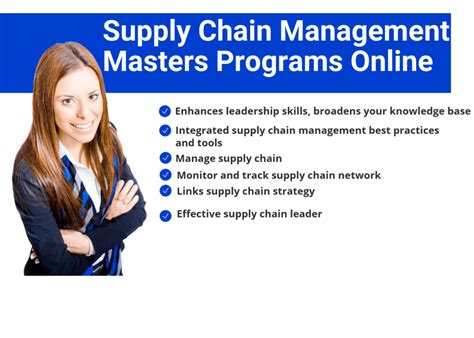Whether you’re a student exploring potential career paths or a professional looking to enhance your skills, the field of supply chain management offers a world of opportunities. American universities are at the forefront of providing comprehensive programs that cover all aspects of this dynamic and essential industry. From core courses to specialized electives, internships to international programs, and industry partnerships to accreditation, there is a wealth of resources available to aspiring supply chain professionals.
In this blog post, we will guide you through the essential components of supply chain management programs offered by American universities. From understanding the basics to evaluating success, we will delve into the various facets of these programs, shedding light on the diverse opportunities for learning and growth. Whether you are looking to enter the field, advance your skills, or network with industry leaders, American universities are well-equipped to support your goals. Join us as we explore the world of supply chain management education and the exciting prospects it holds for your future.
Table of Contents
Understanding the Basics: Introduction to Supply Chain Management
Supply Chain Management is the process of managing the movement and storage of raw materials, work-in-progress inventory, and finished goods from point of origin to point of consumption. It involves coordinating and integrating these flows both within and among companies. The goal is to streamline the process and reduce costs while delivering the highest possible level of customer satisfaction.
Understanding the basics of Supply Chain Management involves learning about the key components of the supply chain, including procurement, production, transportation, and distribution. It also requires an understanding of the technologies and strategies used to optimize the flow of goods and information.
Students studying supply chain management are introduced to concepts such as demand forecasting, inventory management, and logistics. They also learn about the importance of collaboration and communication across different areas of the supply chain, as well as the impact of global events and market trends.
Overall, a strong foundation in supply chain management is essential for anyone looking to understand the complex network of processes that go into ensuring that products are made and delivered in the most efficient and cost-effective manner.
Building a Strong Foundation: Core Courses in Supply Chain Management
When pursuing a degree in Supply Chain Management, it is essential to have a strong foundation in core courses that provide the necessary knowledge and skills to succeed in this dynamic field.
Core courses in Supply Chain Management typically cover essential topics such as logistics, operations management, procurement, and inventory management. These courses are designed to provide students with a comprehensive understanding of the key concepts and principles that form the backbone of effective supply chain practices.
Furthermore, core courses often emphasize the use of cutting-edge technologies and analytical tools that are essential for managing supply chains in today’s global marketplace. Students are exposed to real-world case studies and scenarios that allow them to apply theoretical knowledge to practical challenges, preparing them for the complexities of modern supply chain operations.
Overall, core courses play a crucial role in equipping students with the foundational knowledge and skills necessary to excel in the field of Supply Chain Management, laying the groundwork for a successful career in this rapidly evolving industry.
Exploring Specialized Areas: Elective Courses in Supply Chain Management
When pursuing a degree in supply chain management, students have the opportunity to delve into a variety of specialized areas through elective courses. These courses offer an in-depth exploration of specific topics within the field, allowing students to tailor their education to their interests and career goals.
One popular elective course is Global Logistics and Distribution Management, which provides students with a comprehensive understanding of the complexities involved in managing a global supply chain. Topics covered may include international transportation, customs compliance, and distribution network design.
Another option is Sustainable Supply Chain Management, which focuses on the growing importance of ethical and environmentally-friendly practices within the industry. Students may study strategies for reducing carbon footprint, ethical sourcing, and green procurement.
Students also have the opportunity to take Data Analytics for Supply Chain Management, where they can learn how to leverage data and technology to optimize supply chain operations. This course may cover topics such as predictive analytics, data visualization, and the use of software tools for supply chain optimization.
Real-World Application: Internships and Co-Op Programs
Internships and Co-Op programs play a crucial role in providing students with real-world experience and practical knowledge in supply chain management. These programs offer the opportunity for students to apply the theoretical concepts they have learned in the classroom to actual business situations.
Engaging in internships and Co-Op programs allows students to gain valuable insights into different aspects of the supply chain, including procurement, logistics, and operations. This hands-on experience helps students develop a deeper understanding of the industry and prepares them for future career opportunities.
Furthermore, internships and Co-Op programs provide students with the chance to network with industry professionals and gain mentorship from experienced professionals. This exposure can be invaluable in shaping their career paths and opening doors to potential job opportunities upon graduation.
Overall, internships and Co-Op programs are a critical component of a comprehensive supply chain management education, providing students with the necessary tools and experiences to succeed in the competitive global marketplace.
Preparing for the Future: Supply Chain Management Research and Innovation
As the field of supply chain management continues to evolve, it is essential for professionals to stay ahead of the curve by engaging in research and innovation. This proactive approach not only ensures that individuals remain competitive in the job market, but also contributes to the overall advancement of the industry.
Engaging in research allows supply chain management professionals to gain a deeper understanding of current trends and challenges. By staying up to date with the latest industry developments, individuals can identify opportunities for improvement and develop innovative solutions to complex problems. Furthermore, conducting research provides professionals with the knowledge and expertise needed to make strategic decisions that positively impact their organizations.
In addition to conducting research, supply chain management professionals can also contribute to innovation within the field. This can involve developing new technological tools to streamline processes, implementing sustainable practices to reduce environmental impact, or creating collaborative partnerships to foster industry growth. By embracing innovation, individuals can drive positive change and position themselves as leaders in the field.
Overall, by actively participating in research and innovation, supply chain management professionals can effectively prepare for the future and contribute to the continued advancement of the industry.
Going Global: International Supply Chain Management Programs
Expanding your knowledge and experience in supply chain management to an international level can open up numerous opportunities for career growth and professional development. International supply chain management programs provide students with the chance to learn about global business operations, cross-cultural communication, and international trade practices.
Through these programs, students can gain exposure to different supply chain strategies and practices in various countries, gaining valuable insight into the complexities of managing global supply chains. They also have the opportunity to work on real-world case studies and projects that involve international logistics, trade compliance, and global sourcing.
International supply chain management programs often include study abroad or exchange opportunities, allowing students to immerse themselves in different business environments and gain a deeper understanding of global supply chain dynamics. This firsthand experience can be invaluable for those seeking careers in multinational corporations or international trade organizations.
Furthermore, participating in international supply chain management programs can help students develop a global mindset, improve their intercultural skills, and expand their professional networks on a global scale. These programs also provide access to industry professionals and experts from around the world, offering valuable insights into global supply chain trends and best practices.
Gaining Industry Insight: Guest Lectures and Industry Partnerships
Guest lectures and industry partnerships are crucial components of a comprehensive supply chain management education. These opportunities provide students with valuable insights into the real-world application of supply chain principles and allow them to learn from industry experts with years of experience in the field.
By attending guest lectures, students have the chance to hear from professionals who can offer unique perspectives on current industry trends, best practices, and emerging technologies. This exposure to diverse ideas and experiences can enrich students’ understanding of supply chain management and prepare them to tackle the complex challenges they will face in their future careers.
Industry partnerships also play a vital role in a supply chain management program, as they provide students with opportunities for hands-on learning and practical experience. These partnerships often take the form of internships, co-op programs, or collaborative projects with industry partners, allowing students to apply their classroom knowledge in a real-world setting and gain a deeper understanding of the industry’s operations and processes.
Furthermore, industry partnerships can open doors to potential career opportunities for students, as they enable them to build connections and network with industry professionals. This collaboration between academia and industry not only benefits students by enhancing their learning experience, but also benefits the industry by nurturing a pipeline of talented and skilled supply chain professionals.
Networking and Collaboration Opportunities: Supply Chain Management Associations
Supply chain management is a complex and dynamic field that requires close collaboration and networking with industry professionals. One of the best ways to build connections and gain insights into the latest trends and practices in the industry is by joining supply chain management associations. These organizations provide a platform for professionals, academics, and students to come together, share knowledge, and collaborate on various initiatives.
Supply chain management associations offer a wide range of networking opportunities, including conferences, seminars, workshops, and webinars. These events bring together experts from different sectors of the supply chain industry, providing an excellent platform for exchanging ideas, learning about best practices, and fostering collaboration. Additionally, these associations often organize networking events, allowing members to connect with potential employers and industry leaders.
Moreover, joining a supply chain management association can also provide access to valuable resources such as research papers, industry reports, and case studies. Many associations publish newsletters or journals that keep their members updated on the latest developments in the field, providing an invaluable source of information and learning.
Furthermore, being part of a supply chain management association can open doors to mentorship opportunities, where seasoned professionals can guide and advise newcomers in the industry. This mentorship can be immensely beneficial in helping individuals navigate their careers, develop new skills, and gain valuable insights from experienced professionals.
Creating Career Opportunities: Job Placement and Alumni Network
One of the key factors to consider when choosing a supply chain management program is the job placement rate and the strength of the alumni network. These factors can significantly impact your future career opportunities and potential for success in the field. A program that prioritizes job placement and offers a robust alumni network can provide valuable support and resources as you begin your professional journey in supply chain management.
When researching potential supply chain management programs, it’s important to inquire about their job placement rate and the support they provide to students seeking employment in the field. A program with a high job placement rate demonstrates a track record of successfully preparing graduates for careers in supply chain management. Additionally, an active and involved alumni network can offer valuable connections, mentorship, and job opportunities that can be instrumental in launching your career.
Furthermore, a strong alumni network can provide ongoing support and professional development opportunities throughout your career. The connections and relationships you establish within the alumni network can open doors to new career opportunities, industry insights, and potential collaborations. Additionally, staying connected with fellow alumni can be an invaluable source of support and guidance as you navigate your career path in supply chain management.
Ultimately, a supply chain management program that prioritizes job placement and maintains a strong alumni network demonstrates a commitment to the success and professional development of its graduates. By choosing a program that offers these essential resources, you can position yourself for a successful and rewarding career in supply chain management.
Evaluating Success: Accreditation and Rankings of Supply Chain Management Programs
When considering a career in supply chain management, it’s important to evaluate the success of potential programs. One way to do this is by looking at the accreditation and rankings of the programs you are interested in.
Accreditation is a crucial factor to consider when choosing a supply chain management program. Accredited programs have been evaluated and approved by a recognized accrediting body, ensuring that they meet certain standards of quality and rigor. This can give you confidence that the program you choose will provide a high-quality education and prepare you for a successful career in the field.
Similarly, rankings can provide valuable insights into the quality and reputation of supply chain management programs. Many organizations publish rankings of business and management programs, including those focused on supply chain management. These rankings take into account factors such as academic quality, faculty expertise, and student outcomes, providing a comprehensive look at the strengths and weaknesses of different programs.
By carefully evaluating the accreditation and rankings of supply chain management programs, you can make an informed decision about which program is the best fit for your goals and aspirations. Whether you are looking for a program that is highly regarded in the industry or one that offers a more specialized focus, taking the time to research and consider these factors can help you set yourself up for success in your supply chain management career.






